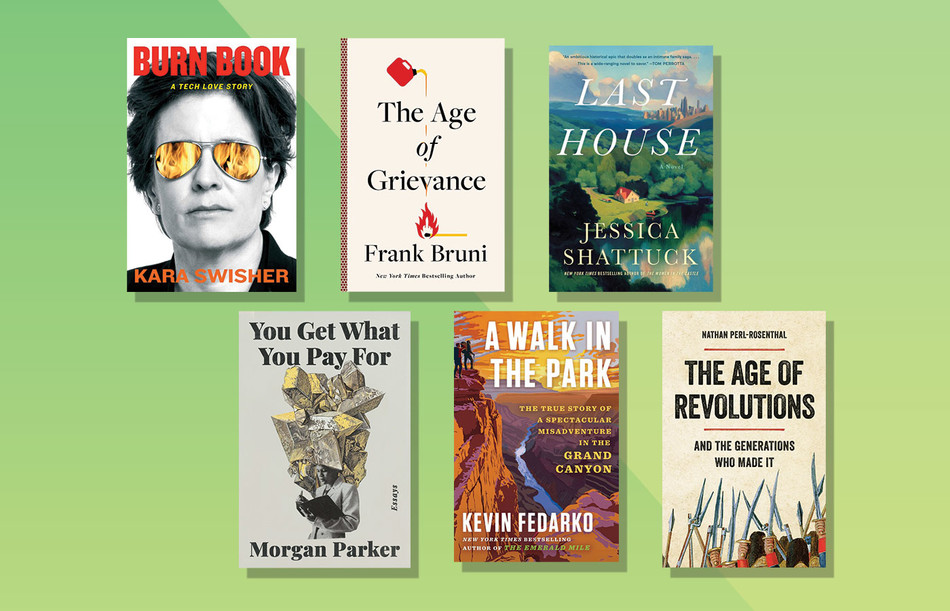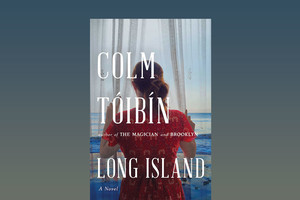Burn Book
By Kara Swisher ’85JRN
Journalist and podcaster Kara Swisher has covered American tech since the dot-com boom in the early 1990s and has become known for holding industry leaders accountable in her no-holds-barred interviews. With thirty years of unparalleled access to a who’s who of Silicon Valley — from Jeff Bezos to Steve Jobs to Mark Zuckerberg — she has plenty of tea to spill in her much-hyped new book. But there’s more than just gossip here: it’s a thoughtful history of a period that has irrevocably changed our world and a surprisingly hopeful vision of the potential role of tech in our future.
Last House
By Jessica Shattuck ’01SOA
In her latest novel, Jessica Shattuck, the best-selling writer of The Women in the Castle, captures two generations, each caught up in the politics of their time. The book opens in 1953, when World War II vet Nick Taylor, a lawyer for a major American oil company, gets drawn into the Iranian coup d’état. Meanwhile, his wife, Bet, once an Army code-breaker, bides her time in the suburbs, raising their children, Katherine and Harry. Fifteen years later, those children are grown and protesting all that their parents stood for, Katherine at a liberal newspaper in Morningside Heights and Harry near the family’s country home in Vermont.
The Age of Grievance
By Frank Bruni ’88JRN
American politics has changed drastically over the last several decades. In his compelling new book, Frank Bruni argues that much of that change can be attributed to a cultural shift in attitude: we’ve become a nation of whiners. Bruni writes that Americans on both sides of the aisle feel victimized and aggrieved (though he is clear that he thinks the Right has weaponized this tactic in more dangerous ways), and politicians have responded in kind. Bruni contends that while grievance is not a new concept, and has historically often been good, this new era is different. Legitimate complaints are lost among exaggerated ones. And in a nation with broad gun ownership, the results can be devastating.
You Get What You Pay For
By Morgan Parker ’10CC
The author of three award-winning poetry collections and a young-adult novel, Morgan Parker has a bold, provocative, often hilarious voice, and her insights about Black womanhood in contemporary America have resonated with a wide audience. But in her personal life, Parker often feels isolated and alone: “I’m a poet who has never experienced true romantic love; I believe this is an American tragedy.” Her latest book, an essay collection, explores this and other intimate themes, with plenty of reflection on the greater societal contexts.
A Walk in the Park
By Kevin Fedarko ’88CC
Veteran journalist Kevin Fedarko is no stranger to the Grand Canyon: his first book, The Emerald Mile, told the story of a thrill seeker who rode a wooden boat the entire length of the Colorado River. But now, Fedarko himself is the adventurer. Accompanied by National Geographic photographer Pete McBride, Fedarko embarked on a 750-mile, end-to-end trek through the awe-inspiring gorge. With no marked trail, punishing temperatures, and death-defying cliffs, it’s considered one of the hardest hikes in the world — and indeed, the year-long trip nearly killed them both. Fedarko’s prose is often funny, but he also pays appropriate respect to both the land and the native people that have called it home for thousands of years.
The Age of Revolutions
By Nathan Perl-Rosenthal ’11GSAS
In an ambitious survey of what Thomas Paine called “the age of revolutions,” historian Nathan Perl-Rosenthal traces revolutionary movements of the late eighteenth and early nineteenth centuries in North America, Spanish America, Europe, and Haiti. Producing the first narrative history of the era, Perl-Rosenthal assembles a cast of famous (John Adams, Napoleon, Toussaint Louverture) and lesser-known figures (Peruvian nun Maria De La Concepción Rivadeneyra) to show how two generations forged massive transformations and how political progress often came at the expense of racial and social equality.



